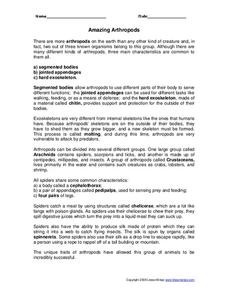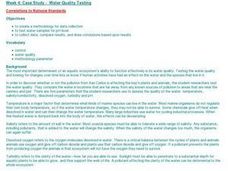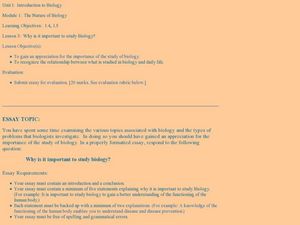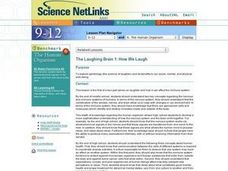Curated OER
How We Learn About the Brain: Teaching the Infant Brain
Young scholars describe the development of an infant from conception to birth. In this biology lesson, students discover how a child's brain develop. They explain how children acquire motor and cognitive skills.
Curated OER
Evidence for Evolution
In this evidence of evolution worksheet, students review notes given by referring to the Nelson Biology text, chapter 11/13. Students read the notes and the specified pages in the text.
Curated OER
Characteristics of Snakes and Turtles
Students examine the characteristics of snakes and turtles and compare/contrast reptiles with mammals. They watch a video, answer discussion questions, complete information charts, conduct Internet research, and create a habitat diorama.
Curated OER
Healthy Heart
Young scholars explore how the heart works, examine pictures of a troubled heart, and discuss how to keep the heart healthy.
Curated OER
"Garden Springs Gardeners"
First graders ponder the question of how plants help their lives. They observe and compare properties of several different plants. Differentiate between living organisms and nonliving objects.
Curated OER
Monarch Migration
Third graders investigate the life cycle of the Monarch butterfly. They experiment with various tools to simulate the mouth parts of insects, conduct research, record their observations of butterflies hatching, write a play, complete...
Curated OER
You...Instead of the Onion Skin
Students observe their own epithelial cells from the inside linings of their cheeks using DigiScope technology. They prepare a slide with both onion cells and epithelial cells and make an illustrated booklet for a PowerPoint presentation...
Curated OER
Amazing Arthropods
In this amazing arthropods worksheet, students read for information and assess comprehension. In this true and false, fill in the bank, multiple choice and short answer worksheet, students write answers to ten questions.
Curated OER
Water Quality Testing
Student explore factors affecting ecosystems. They test local water samples for pH level. After creating a methodology for data collection, they collect data, compare results, and draw conclusions based upon results.
Curated OER
Fifth Grade Life Science Review/Quiz
In this life sciences review or quiz worksheet, 5th graders use recall of knowledge to answer multiple choice questions. Students answer 20 questions.
Curated OER
Getting Up the Nerve
Students examine the basics of the nervous system through an interactive program. They discover how the brain is linked to muscle movement. They can test cells through the interactive program to see how it reacts to different stimuli.
Curated OER
Butterfly Life Cycle
Second graders explore biology. In this life cycle lesson, 2nd graders act out the stages a caterpillar goes through to become a butterfly. They spend days prior to this lesson observing caterpillars they have collected and developing...
Curated OER
Live Well Now to Live Longer Later
Ninth graders select a topic to research, completing the sentence, "Are the effects of _______ really that detrimental to one's health?" They record information in a journal, including sources of information. Students work in groups with...
Curated OER
Why is it important to study Biology?
Young scholars study the importance of biology. In this biology lesson students write an essay on biology and its importance.
Curated OER
Virus Tracker
Sixth graders will simulate the spread of a virus such as HIV through a population by "sharing" (but not drinking) the water in a plastic cup with several classmates. Although invisible, the water in a few of the cups will already be...
Curated OER
Feedback and Flowcharts
Sixth graders explain what a negative feedback system is and they distinguish it from a positive feedback system. They describe examples of how negative feedback is used in both nature and technology. , Students define homeostasis, and...
Curated OER
Anatomy of the Heart
Tenth graders examine the different parts of the heart. In this biology lesson, 10th graders perform dissection of the fetal pig. They explain how the heart maintains homeostasis.
Curated OER
Vital Vitamins
Students study vitamins and who should take them and what ones to take. In this investigative lesson students plan a healthy diet after reviewing the types of supplements.
Curated OER
A Giraffe Debate
Learners study the life, adaptations, and habitats of giraffes. They investigate the issue of giraffe survival in the wild or in a wildlife sanctuary. They conduct a class debate and present position papers.
Curated OER
Frog Metamorphosis
Students play 20 Questions with animal characteristics and then view an animation of how a tadpole changes into a frog. They consider the importance of camouflage to frogs and write out the story of a frog from tadpole to adult.
Curated OER
Diseases of the Eye
Fifth graders research diseases of the eye. In this science lesson, 5th graders discuss and research eye diseases and complete a worksheet using the information they find.
Curated OER
How Alzheimer's Affects the Brain
Students study how Alzheimer's affects different parts of the brain, sketch a healthy neuron and its parts, and diagram brain changes during the early and late stages of Alzheimer's.
Curated OER
Can You Beat Jet Lag?
Learners examine the health condition of jet lag. Using mealworms, they test the effect of light on the development of them into adults. They answer discussion questions and examine the relationship of age and one's activity level.
Curated OER
The Laughing Brain 1: How We Laugh
Students to rate themselves on a scale from 1 to 10 (10 being the happiest) as to how happy they feel and write their rating on a sheet of paper. They explore gelotology (the science of laughter) and its benefits to our social, mental,...























